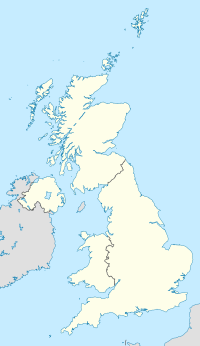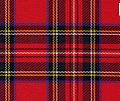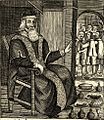Portal:United Kingdom
The United Kingdom Portal
 |
 |

| |
The United Kingdom of Great Britain and Northern Ireland, commonly known as the United Kingdom (UK) or Britain, is a country in Northwestern Europe, off the coast of the continental mainland. It comprises England, Scotland, Wales, and Northern Ireland. The UK includes the island of Great Britain, the north-eastern part of the island of Ireland, and most of the smaller islands within the British Isles, making up a total area of 94,354 square miles (244,376 km2). Northern Ireland shares a land border with the Republic of Ireland; otherwise, the United Kingdom is surrounded by the Atlantic Ocean, the North Sea, the English Channel, the Celtic Sea, and the Irish Sea. The United Kingdom had an estimated population of over 68.2 million people in 2023. The capital and largest city of both England and the United Kingdom is London, whose wider metropolitan area is the largest in Western Europe, with a population of 14.9 million. The cities of Edinburgh, Cardiff, and Belfast are the national capitals of Scotland, Wales, and Northern Ireland, respectively.
The lands of the UK have been inhabited continuously since the Neolithic. In AD 43, the Roman conquest of Britain began; the Roman departure was followed by Anglo-Saxon settlement. In 1066, the Normans conquered England. With the end of the Wars of the Roses, the English state stabilised and began to grow in power, resulting by the 16th century in the annexation of Wales, the domination of Scotland, and the establishment of the British Empire. Over the course of the 17th century, the role of the British monarchy was reduced, particularly as a result of the English Civil War. In 1707, the Kingdom of England and the Kingdom of Scotland united under the Treaty of Union to create the Kingdom of Great Britain. The Acts of Union 1800 incorporated the Kingdom of Ireland to create the United Kingdom of Great Britain and Ireland in 1801. Most of Ireland seceded from the UK in 1922 as the Irish Free State, and the Royal and Parliamentary Titles Act 1927 created the present United Kingdom.
The UK became the first industrialised country and was the world's foremost power for the majority of the 19th and early 20th centuries, particularly during the Pax Britannica between 1815 and 1914. The British Empire was the leading economic power for most of the 19th century, a position supported by its agricultural prosperity, its role as a dominant trading nation, a massive industrial capacity, significant technological achievements, and the rise of 19th-century London as the world's principal financial centre. At its height in the 1920s, the British Empire encompassed almost a quarter of the world's landmass and population, and was the largest empire in history. However, its involvement in the First World War and the Second World War damaged Britain's economic power and a global wave of decolonisation led to the independence of most British colonies. (Full article...)
Featured article
HMS Cardiff (D108) is a Type 42 destroyer, the third ship of the Royal Navy to be named in honour of the Welsh capital city of Cardiff. She was built by Vickers Shipbuilding and Engineering in Barrow-in-Furness, Cumbria and launched on 22 February 1974. During her career, Cardiff served in the Falklands War, where she shot down the last Argentine aircraft of the conflict and accepted the surrender of a 700-strong garrison in the settlement of Port Howard. During the 1991 Gulf War, her Lynx helicopter sank two Iraqi minesweepers. She later participated in the build-up to the 2003 invasion of Iraq as part of the Royal Navy's constant Armilla patrol; Cardiff thwarted attempts to smuggle oil out of the country, but was not involved in the actual invasion. Cardiff was decommissioned in July 2005, having earned two battle honours for service in the Falklands and Gulf wars. She is currently moored in Portsmouth Harbour, next to sister ship HMS Newcastle. Former servicemen have petitioned for her preservation as a museum ship and local tourist attraction at Cardiff, but her fate remains undecided. (Full article...)
Featured biography
Edward VIII (1894–1972) was King of Great Britain, Ireland, the British Dominions beyond the Seas, and Emperor of India from the death of his father, George V, on 20 January 1936, until his abdication on 11 December 1936. As a young man he served in World War I, undertook several foreign tours on behalf of his father, and was associated with a succession of older married women. Only months into his reign, Edward forced a constitutional crisis by proposing marriage to the American divorcée Wallis Simpson. Although legally Edward could have married Mrs. Simpson and remained king, his various prime ministers opposed the marriage, arguing that the people would never accept her as queen. Edward knew that the ministry of British Prime Minister Stanley Baldwin would resign if the marriage went ahead; this could have dragged the King into a general election thus ruining irreparably his status as a politically neutral constitutional monarch. Rather than give up Mrs. Simpson, Edward chose to abdicate. He is one of the shortest-reigning monarchs in British history, and was never crowned. (Full article...)
General images -
Subportals
WikiProjects
Things you can do
- Visit the British Wikipedians' notice board.
- The noticeboard is the central forum for information and discussion on editing related to the United Kingdom.
- Comment at the British deletion sorting page.
- This page lists deletion discussions on topics relating to the United Kingdom.
Featured pictures
Did you know -

- ... that Dublin property developer Harry Crosbie received an OBE from the British ambassador to Ireland, partly for entertaining Elizabeth II with his showbiz contacts?
- ... that a yellow-spotted emerald specimen was found for the first time in the United Kingdom in 2018, when a wildlife photographer used Twitter to identify it?
- ... that David P. Davies was the chief test pilot for the United Kingdom's Civil Aviation Authority for 33 years?
- ... that a 2007 European Court of Human Rights case ruled that European automobile owners do not have the right to remain silent when asked who was speeding in their vehicle?
- ... that a Space Forge satellite is scheduled to fly on the first-ever satellite launch from the United Kingdom?
- ... that the Royal Navy's 4th Submarine Squadron operated from Sydney to train Australian personnel in anti-submarine warfare?
In the news
- 19 December 2024 – Russian invasion of Ukraine
- Military aids during the Russian invasion of Ukraine, United Kingdom and the Russian invasion of Ukraine
- 19 December 2024 – Georgia–United Kingdom relations, Georgia–United States relations, 2024 Georgian post-election protests
- The United Kingdom and the United States impose sanctions on Georgian officials, including Interior Minister Vakhtang Gomelauri, in response to alleged violent crackdowns on pro-European protests. (EFE)
- 18 December 2024 – Legal affairs of the Tate brothers
- The Westminster Magistrates' Court rules that British police may seize £2.2 million (US$2.5 million) from influencer Andrew Tate and his brother Tristan for allegedly failing to pay taxes on profits from their online ventures. (DW)
- 15 December 2024 – Free trade agreements of the United Kingdom
- The United Kingdom joins the Comprehensive and Progressive Agreement for Trans-Pacific Partnership, becoming the 12th member and the first European member. (Reuters)
- 11 December 2024 – 2024 United Kingdom farmers' protests
- Hundreds of tractors block Whitehall in protest of Labour government changes to agricultural inheritance tax. (The Independent)
- 7 December 2024 – 2024–25 European windstorm season
- Two people are killed by falling trees in England and more than 1.5 million people experience power outages in Ireland and the United Kingdom as Storm Darragh hits the British Isles. (BBC News) (Sky News)
Categories
Other UK-connected Wikipedias
Wikimedia
The following Wikimedia Foundation sister projects provide more on this subject:
-
Commons
Free media repository -
Wikibooks
Free textbooks and manuals -
Wikidata
Free knowledge base -
Wikinews
Free-content news -
Wikiquote
Collection of quotations -
Wikisource
Free-content library -
Wikiversity
Free learning tools -
Wikivoyage
Free travel guide -
Wiktionary
Dictionary and thesaurus






















































































![Image 5 George IV Artist: Sir Thomas Lawrence An oil on canvas portrait of George IV of the United Kingdom as the Prince Regent, by Sir Thomas Lawrence. In 1814, Lord Stewart, who had been appointed ambassador in Vienna and was a previous client of Thomas Lawrence, wanted to commission a portrait by him of the Prince Regent. He arranged that Lawrence should be presented to the Prince Regent at a levée. Soon after, the Prince visited Lawrence at his studio in Russell Square. Lawrence wrote to his brother that: To crown this honour, [he] engag'd to sit to me at one today and after a successful sitting of two hours, has just left me and comes again tomorrow and the next day. More featured pictures](/uploads/wikipedia/commons/thumb/9/9f/George_IV_bust1.jpg/84px-George_IV_bust1.jpg?auto=webp)































